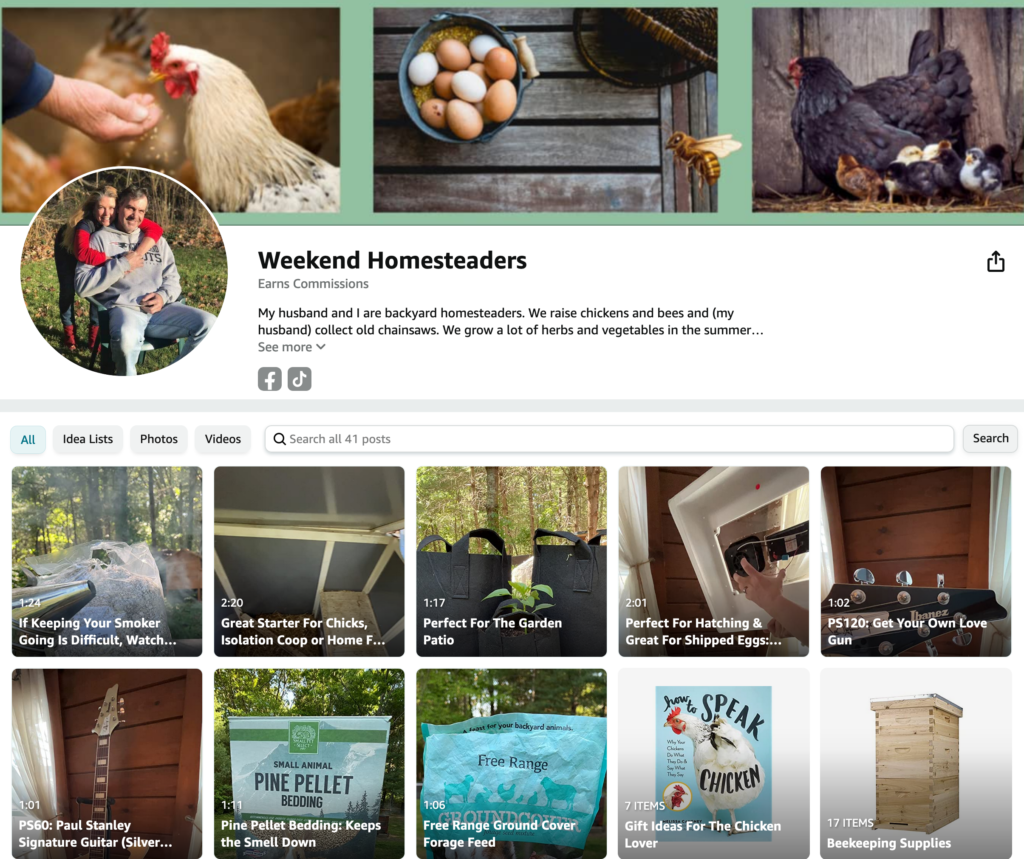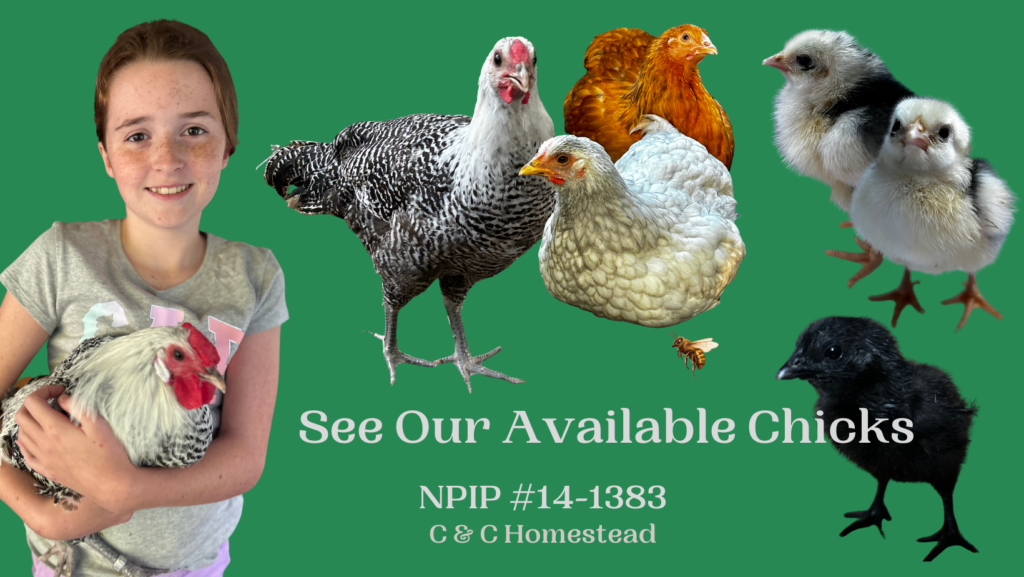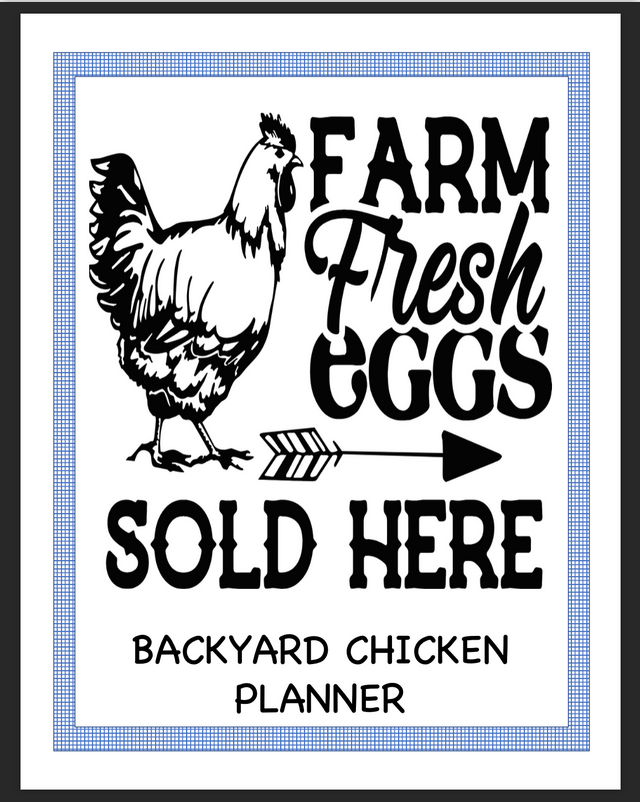Balancing Corporate & Homesteading Lifestyles
The Difference Between Chicken Wire and Hardware Cloth

Understanding the differences between chicken wire and hardware cloth will help you better predator-proof your coop. Here's what you need to know.
Rooster Behavior: Scouting For Food & Protection While Eating
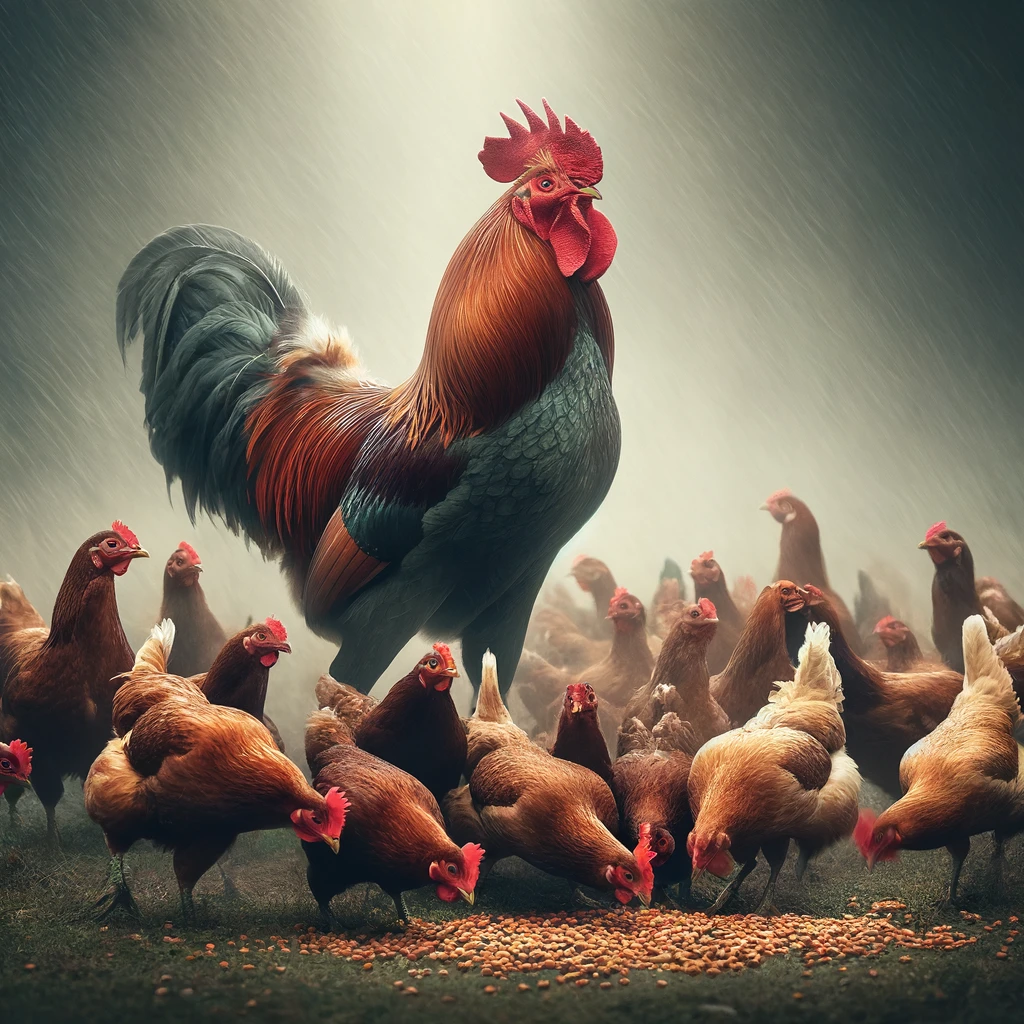
Roosters fulfill several critical roles within the hierarchy of a chicken flock, prominently among them are scouting for food and protecting the flock during feeding. These behaviors are not only fundamental to the rooster's role as a leader but also essential for the safety and nutritional health of the entire flock.
Here’s an in-depth look at each of these important behaviors:
Scouting for Food
- Proactive Foragers:
- Roosters are typically the most active and vigilant members of a chicken flock when it comes to searching for food. They use their heightened senses to locate food sources that may not be immediately obvious.
- They often venture farther from the coop than the hens, exploring diverse environments to assess the availability of food, which can include seeds, insects, and small invertebrates.
- Leadership in Foraging:
- When a rooster finds a significant source of food, he will often signal to the hens using specific calls. This not only helps in directing the hens to food but also reinforces the rooster's role as a leader.
- The rooster's ability to find and share food resources plays a key role in the pecking order, enhancing his status and importance within the flock.
- Use of Visual and Vocal Signals:
- Roosters often use a combination of movements and noises to catch the attention of their flock. A common behavior is the tidbitting motion, where the rooster picks up and drops food while making distinctive sounds to alert the hens that food is available.
- Assessment of Safety:
- Before signaling the hens, roosters will typically ensure that the food source is safe. This involves a quick survey of the surrounding area for potential threats, ensuring the safety of the flock before they begin to eat.
Protection While Eating
- Vigilance:
- As the hens feed, the rooster’s role shifts predominantly to that of a lookout. Staying alert, the rooster watches for potential predators or other dangers, allowing the hens to feed without distraction or distress.
- This vigilance is crucial, particularly in open areas or where the flock is more exposed to potential threats from aerial or ground predators.
- Positioning:
- During feeding, roosters often position themselves on a slightly elevated point or an open spot where they have a clear view of the surroundings. This strategic positioning helps them to detect threats more efficiently.
- Roosters may also patrol the area, walking around the flock, to keep a constant watch over different angles.
- Immediate Response:
- If a threat is detected, roosters respond immediately, often with loud alarm calls that signal the hens to flee to safety. They may also confront or try to distract predators to protect the hens and chicks.
- Roosters are known for their bravery, facing off against much larger predators to defend their flock.
- Post-Feeding Gathering:
- Once the feeding is complete, roosters typically lead the hens back to the safety of the coop or to another secure area. This ensures that the flock remains cohesive and protected throughout the day’s activities.
These behaviors exemplify the rooster's integral role in not only the survival of the flock but also in maintaining its social structure. By scouting for food and providing vigilant protection, roosters contribute significantly to the overall well-being and productivity of the flock, demonstrating their importance as more than just breeders within the community.
Healthy Herbs For Chickens: Oregano
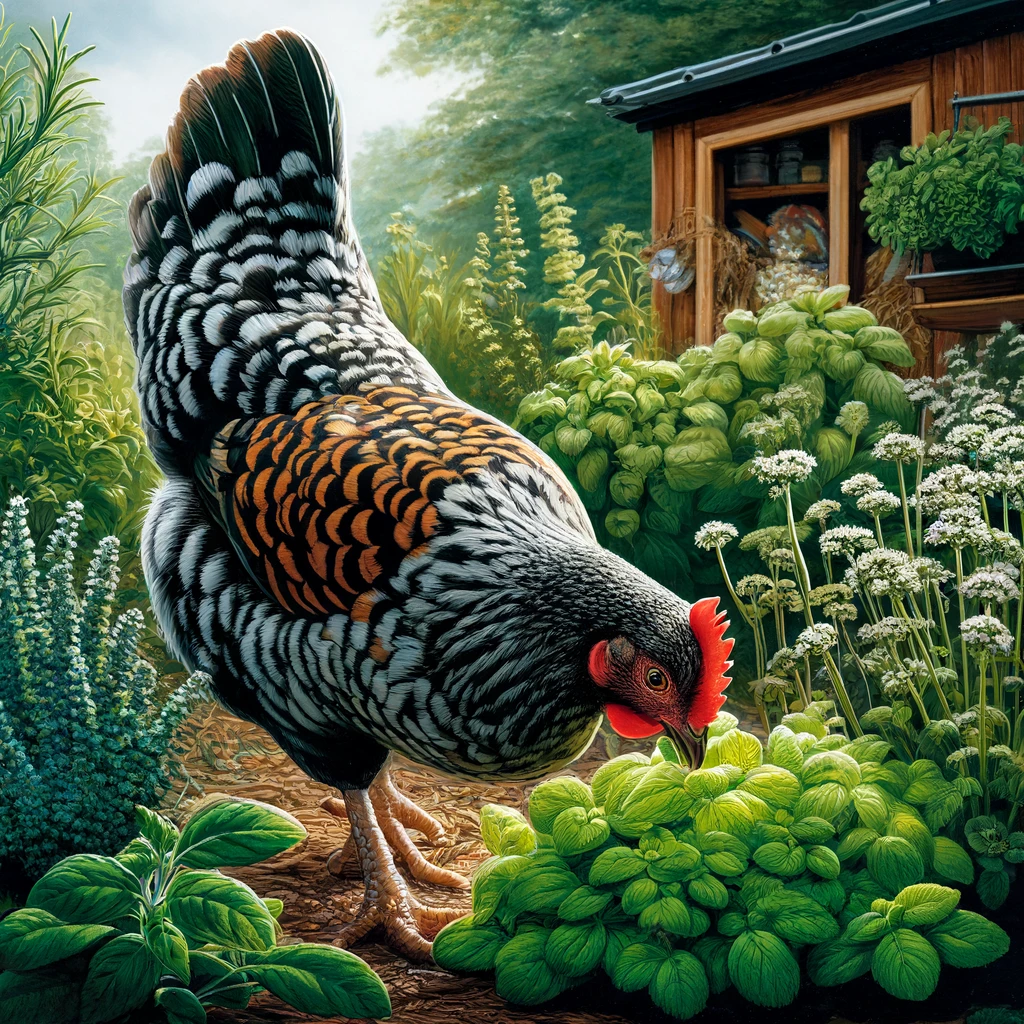
Oregano is more than just a culinary herb; it is a powerhouse of nutrients and beneficial properties that can greatly enhance the health of backyard chickens. Here’s a detailed look at why oregano is beneficial for chickens, how it can be used, and tips for growing it near your coop.
Nutritional and Health Benefits of Oregano for Chickens:
- Antibacterial and Antimicrobial Properties: Oregano contains carvacrol and thymol, two compounds that have been shown to provide antibacterial and antimicrobial benefits. These compounds help in fighting against common bacterial infections like E. coli and Salmonella, which are of particular concern in poultry.
- Antioxidant Properties: Oregano is rich in antioxidants, which help combat the effects of oxidative stress in chickens. This is particularly beneficial for improving the overall immune system, making chickens more resilient against diseases.
- Anti-Parasitic Effects: Some studies suggest that oregano can help reduce the load of intestinal parasites which are common in chickens.
- Respiratory Health: The herb is known to help with respiratory health, easing symptoms of respiratory diseases which can be common in chickens, especially in damp conditions.
How to Use Oregano with Chickens:
- Dried Oregano in Feed: You can mix dried oregano directly into your chickens’ feed. A general recommendation is to mix about 1% of the total feed volume as dried oregano. This method is the easiest way to ensure that all chickens receive its benefits.
- Fresh Oregano: If you grow oregano, you can offer fresh leaves to your chickens. They can peck at these leaves as part of their forage. Fresh oregano is not only a treat but also provides a potent dose of essential oils.
- Oregano Oil Supplement: Commercially prepared oregano essential oil can be used as a dietary supplement. Add a few drops to their drinking water as per the product’s dosage instructions. Be cautious with concentration as essential oils are potent.
- Oregano Tea: Another way to administer oregano is by making an herbal tea. Steep oregano leaves in hot water, cool the mixture, and add it to the chickens' water supply. This can be particularly soothing if chickens are showing signs of respiratory distress.
Growing Oregano for Chickens:
- Planting Location: Oregano is a hardy perennial that thrives in full sun. It can be planted directly in the garden or in containers. If planting near the chicken coop, ensure it is protected from over-foraging by chickens.
- Soil Requirements: Plant oregano in well-draining soil with a neutral to slightly alkaline pH. Oregano does not require highly fertile soil and can do well in average conditions.
- Watering: Oregano needs regular watering initially but is quite drought-tolerant once established. Overwatering or poor drainage can lead to root diseases.
- Harvesting: Harvest oregano leaves as needed. For the best flavor and potency, harvest leaves just before the plant flowers. Cut the stems back to encourage bushier growth.
- Winter Care: In colder climates, mulch around the plants in autumn to protect them from freezing temperatures.
Using oregano in your chicken care routine provides a natural and effective way to support their health, acting as a supplement to their diet and an integral part of holistic poultry management. Not only does it benefit the chickens, but it also reduces the need for synthetic medications, aligning with more sustainable and organic farming practices.
Chicken Treat Recipe: Spring Mint & Pea Salad
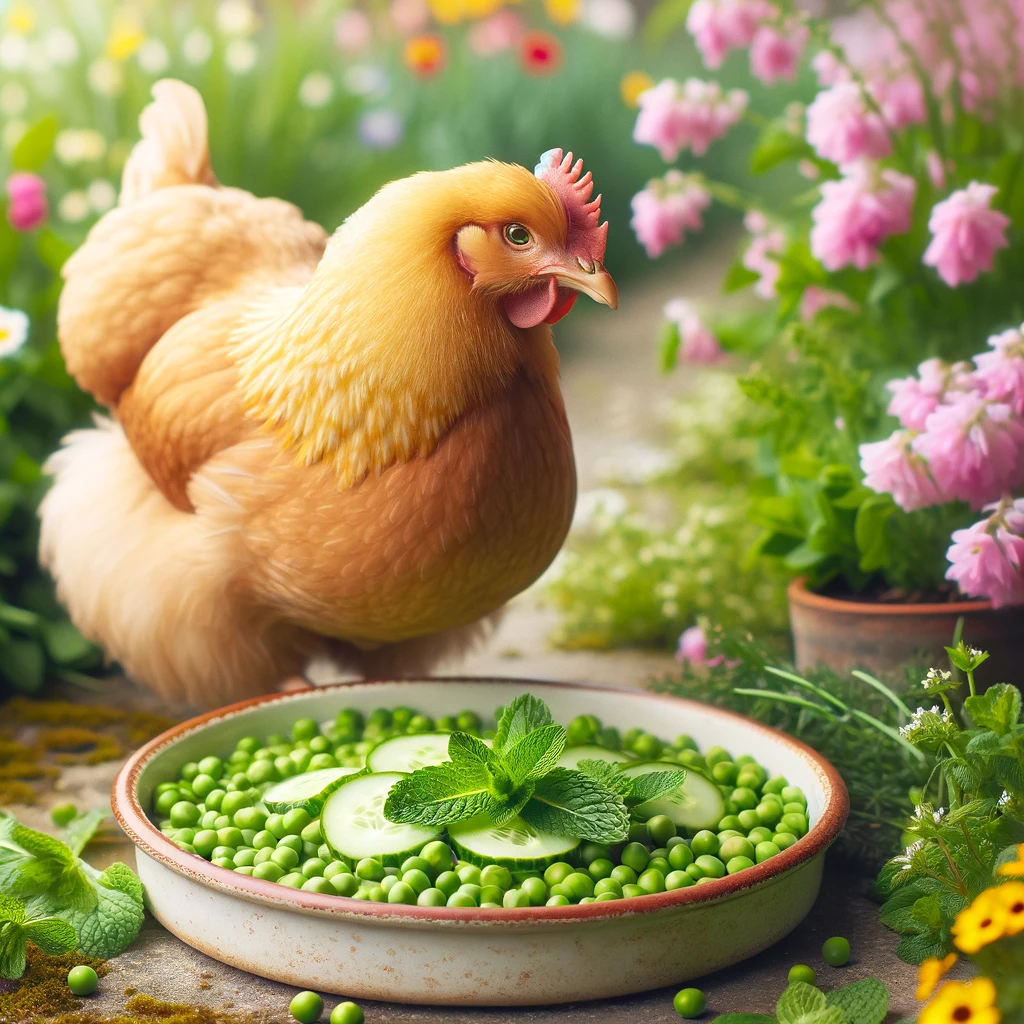
As spring brings fresh growth and warmer weather, it’s the perfect time to treat your chickens to something fresh and nutritious. A Spring Pea and Mint Salad is an excellent choice for a seasonal treat. It’s not only tasty for your chickens but also packed with nutrients that can help improve their health and egg production. Here’s how to prepare this delightful treat:
Ingredients:
- Fresh peas: 1 cup (shelled)
- Fresh mint: A handful of leaves, finely chopped
- Cucumber: Half, diced
- Calcium supplement: 1 tablespoon of crushed eggshells or oyster shell
Benefits of the Ingredients:
- Peas: Rich in protein and vitamins, peas are a great energy source.
- Mint: Acts as a natural digestive aid and can help freshen the breath of your chickens.
- Cucumber: High in water content, it’s perfect for hydration on warmer days.
- Crushed eggshells or oyster shell: Provides calcium, essential for strong eggshells.
Instructions:
- Preparation of Ingredients:
- Peas: If using fresh peas from the pod, ensure they are young and tender. Frozen peas can also be used; just thaw them before use.
- Mint: Rinse the mint leaves thoroughly and chop them finely to release their aroma and make them easier for the chickens to eat.
- Cucumber: Wash the cucumber and cut it into small, chicken bite-sized pieces. Peeling is optional, but ensure any wax or chemicals are thoroughly washed off if leaving the skin on.
- Crushed eggshells: If using eggshells, wash and dry them first. Bake in the oven at 250°F (120°C) for 10 minutes to sterilize, then crush them into a fine powder.
- Mixing:
- In a large bowl, combine the shelled peas, chopped mint, and diced cucumber. Mix these ingredients gently to distribute them evenly.
- Adding Calcium:
- Sprinkle the crushed eggshells or oyster shell over the vegetable mix. This not only adds necessary calcium to your chickens’ diet but also gives them a crunchy texture they enjoy.
- Serving:
- Place the salad in a clean, shallow dish and set it out in your chicken coop or run. Ensure it is easily accessible to all your chickens.
- Observe as they peck at this nutritious and refreshing treat, which is especially welcome on a warm spring day.
- Storage:
- This treat is best served fresh. Any leftovers should be removed after a few hours to prevent spoilage and to keep the coop clean.
Tips for Safety and Enjoyment:
- Always introduce new foods to your chickens gradually to ensure they tolerate it well.
- Ensure that fresh water is available at all times, especially when feeding dry supplements like crushed eggshells.
- Monitor your chickens for any unusual behavior or signs of food intolerance.
This Spring Pea and Mint Salad is a simple and enjoyable way to add variety to your chickens’ diet, utilizing seasonal ingredients that provide both nutritional benefits and hydration. Treats like these not only enhance the health of your chickens but also enrich their environment, keeping them happy and engaged.
The Importance of Calcium & Grit in a Chicken’s Diet
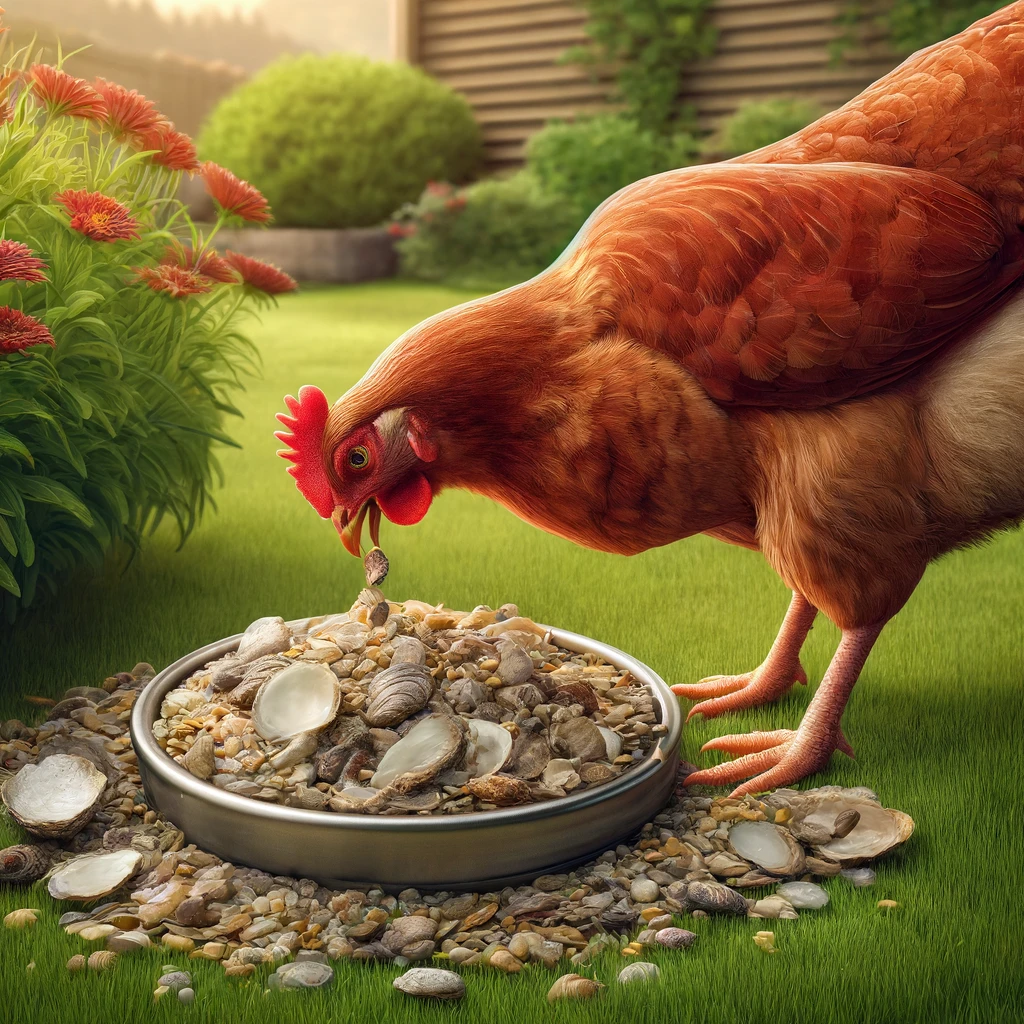
Chickens, like all birds, have unique dietary needs that include the consumption of both grit and calcium. These components are crucial for their digestion and egg production, respectively. Understanding the why, when, and natural sources of these elements can help backyard poultry enthusiasts maintain healthy and productive flocks.
Why Chickens Need Grit
- Digestion: Chickens do not have teeth to chew their food. Instead, they have a specialized part of their stomach called the gizzard, which functions to grind their food. Grit, which consists of small stones or coarse sand, is ingested by chickens and stored in the gizzard. The muscular walls of the gizzard tighten and release, causing the grit to pulverize the food, facilitating digestion.
- Absorption of Nutrients: Properly ground food is essential for the efficient absorption of nutrients. Without grit, chickens can suffer from nutritional deficiencies even if their diet is otherwise adequate.
Why Chickens Need Calcium
- Eggshell Formation: Calcium is a critical component of eggshell formation. Laying hens have a high demand for calcium, and if they don't get enough from their diet, their body will begin to leach calcium from their bones, which can lead to weakened bones and reduced egg-laying performance.
- Muscle Contraction and Nerve Function: Calcium also plays a role in muscle contraction and nerve function in chickens. It helps in the overall health and well-being of the bird.
When Chickens Need Grit and Calcium
- Grit: All chickens need access to grit if they are on a diet that includes whole grains or any other form of non-commercial feed. Even chickens on commercial diets can benefit from grit to aid in the digestion of any incidental material they consume while foraging.
- Calcium: Laying hens need a considerable amount of calcium compared to non-laying chickens. Their need for calcium increases as soon as they start laying eggs and remains high throughout their productive period. It's less critical for roosters and non-laying hens, though it remains an essential mineral for overall health.
Natural Sources of Grit and Calcium
- Natural Sources of Grit:
- Sand: Coarse sand is a good source of grit for chickens and is often found naturally in their environment.
- Small Pebbles: Chickens will naturally pick up small pebbles while foraging.
- Crushed Granite: Often sold as commercial grit, this can be offered in a separate feeder for chickens to consume as needed.
- Natural Sources of Calcium:
- Oyster Shell: This is one of the most common supplements used by chicken keepers. It's typically available in feed stores and should be provided in a separate container so chickens can consume it as needed.
- Eggshells: Cleaned and crushed eggshells can be a good source of calcium. It’s important to crush them finely to prevent the chickens from recognizing them as eggs to avoid egg-eating habits.
- Bone Meal: A fine powdery substance, bone meal is high in calcium and can be mixed into the feed.
- Calcium-Rich Plants: Certain plants, like kale, spinach, and collard greens, have high levels of calcium and can be fed to chickens as part of a balanced diet.
How to Provide Grit and Calcium
- Separate Feeders: It's a good practice to offer both grit and calcium in separate feeders available to the chickens at all times. This allows the birds to consume as much as they need based on their individual requirements.
- Monitor Consumption: Keep an eye on how much grit and calcium your chickens are consuming and adjust the availability as necessary. Consumption rates can give you insights into their dietary needs and overall health.
Providing adequate grit and calcium is a simple yet crucial aspect of chicken care. It ensures efficient digestion and the health of laying hens, contributing significantly to the overall health and productivity of the flock.
Understanding Bee Swarming: Why & How
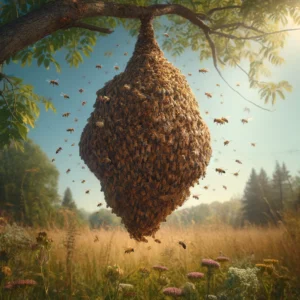
Swarming is a natural part of the developmental cycle of a honey bee colony, involving a large group of bees leaving the original hive to form a new colony. This behavior is both fascinating and crucial for the survival and propagation of bee species. Here's a detailed look at why bees swarm and how they accomplish this feat.
Why Bees Swarm
- Overcrowding: The primary trigger for swarming is a lack of space within the hive. As the colony grows and becomes congested, bees feel cramped and start preparations for swarming to reduce the population and ease the congestion.
- Resource Abundance: A strong nectar flow, which leads to abundant food, can accelerate brood production and quickly lead to overcrowded conditions. This abundance signals the colony that it is a good time to split, as the offshoot will have ample resources to establish a new colony.
- Reproductive Strategy: Swarming is the colony’s method of reproduction. The original colony reproduces by dividing itself into two or more colonies, each with the potential to grow and thrive independently, ensuring genetic diversity and colony survival.
- Age of the Queen: An aging queen may also trigger swarming. As a queen ages, her pheromone production decreases, which may reduce her ability to suppress the worker bees' urge to raise new queens, leading to swarming.
How Bees Swarm
- Preparation: Weeks before the actual swarm, nurse bees begin to raise new queens by feeding selected larvae royal jelly to create queen cells. The old queen also reduces her food intake to slim down enough to fly when the time comes.
- Initiation: The actual swarm usually occurs shortly before the new queens emerge from their cells. The old queen, along with about half of the worker bees, leave the hive in search of a new home. This group includes a mix of old and young bees, workers, and drones.
- Swarm Cluster: After leaving the hive, the swarm of bees may cluster on a branch or a nearby structure. Here, they form a tight cluster around the queen to protect her while scout bees search for a suitable new home. This cluster can be a dramatic sight and is often the first indication to a beekeeper that a swarm has occurred.
- Finding a New Home: Scout bees venture out from the cluster to find a suitable location for the new colony. They evaluate potential sites for size, protection from elements, and other factors. Once they find a suitable site, scouts return to the swarm and perform a "waggle dance" to communicate the location of the new site to other bees.
- Settling In: Once a consensus is reached within the swarm about the new location, the entire swarm flies to this new site. They quickly get to work building new comb, foraging for food, and settling in their new queen, who will soon begin laying eggs to establish the colony.
Beekeeper's Role in Managing Swarms
Beekeepers often try to manage or prevent swarming to keep their hives strong and to maintain honey production levels. Techniques include:
- Providing Adequate Space: Adding more boxes or frames to the hive so that the colony doesn’t feel cramped.
- Replacing Old Queens: Introducing a new queen can deter swarming if the current queen is aging.
- Splitting Hives Manually: If signs of swarming are detected, a beekeeper can preemptively split the hive, simulating the natural process of swarming but under controlled conditions.
Understanding and managing swarming is crucial for beekeepers to maintain healthy and productive colonies, while also ensuring that the natural process of reproduction and genetic diversification among honey bees continues.
🌟 Commitment, Integrity, and the Lessons Learned from a Challenging Rooster 🌟
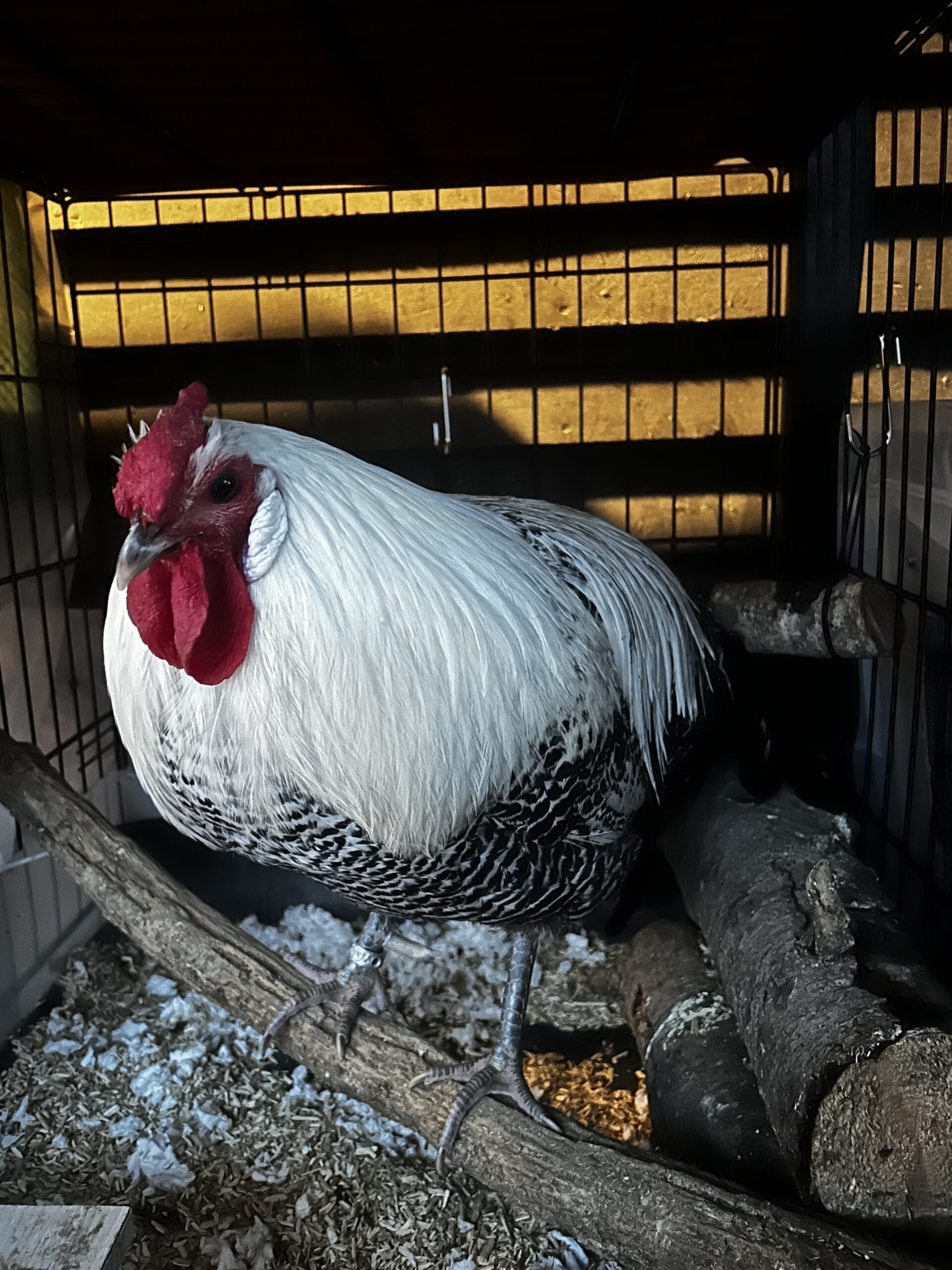
Working with him wasn't just about managing a difficult bird; it was a profound lesson in patience and understanding. It tested my commitment, pushing me to innovate in how I handle and interact with him, all the while maintaining integrity in how I manage my flock. Each day presented new challenges, but also new opportunities to prove that perseverance, guided by our core values, leads to growth and learning.
This journey with my rooster mirrors the challenges we often face in life. Whether it's sticking with a tough project, managing home challenges, or navigating personal goals, the key is to remain committed and true to our principles. Like working with a spirited rooster, life requires us to consistently apply our values, like integrity and patience, no matter the obstacles.
I've learned that integrity is about aligning our actions with our values, not just when it's easy, but especially when it's hard. It's about the commitment to do our best for those who depend on us—even if it’s a challenging rooster.
So, to everyone facing their own 'difficult roosters,' remember that these experiences aren't just obstacles; they are opportunities to reaffirm our commitment to our goals and to our values. Let’s keep pushing forward, with integrity and resolve, knowing that it’s through these challenges that we grow the most.
Stay strong, keep committed, and cherish the value of every moment, even the difficult ones. They are making you stronger and more resilient.
Keep striving, and keep growing,
Elderberry Recipes

Elderberries are celebrated for their rich flavor and health benefits, making them a fantastic ingredient for a variety of recipes.
These recipes showcase elderberries' versatility, from soothing teas and syrups to delightful desserts and homemade wine, offering a wonderful way to enjoy this nutritious and flavorful berry.

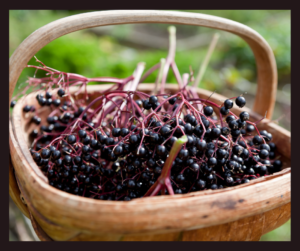

Elderberry Syrup
Ingredients:
- 1 cup fresh or dried elderberries
- 2 cups water
- 1 cup honey
- 1 cinnamon stick
- A few cloves
- 1 slice of fresh ginger
Instructions:
- Combine elderberries, water, cinnamon, cloves, and ginger in a saucepan.
- Bring to a boil, reduce heat, and simmer for about 20-30 minutes.
- Mash the berries to release their juice, then strain the mixture.
- Mix in honey while the liquid is warm. Store in a sealed bottle in the refrigerator.








For more about Elderberry and it's health benefits, visit our Elderberry page.
For Elderflower recipes, visit our Elderflower recipe page.
Disclosure: Guess what? Our blog is like a magical treasure chest, but instead of gold and jewels, it's filled with links that lead to awesome products we love and recommend. When you click on these enchanted links and decide to buy something, we might earn a small bounty, at no extra cost to you. It's our way of keeping the adventure going and bringing you even more fantastic content. So, thank you for supporting our quest and happy treasure hunting!
All About Elderberry

 Elderberry
Elderberry
Health Benefits:

Growing elderberry plants can be a rewarding endeavor for gardeners looking to add both beauty and utility to their green spaces. With their low maintenance needs and high tolerance for different soil types, elderberries are considered relatively easy to cultivate, even for those new to gardening.
However, achieving optimal fruit production does require attention to proper planting conditions, such as sunlight exposure and adequate watering, making the process a delightful challenge for enthusiasts eager to dive into the world of edible landscaping.
Growing Elderberry:
Elderflower Recipes

Elderflowers, the delicate, creamy-white flowers of the elderberry plant (Sambucus nigra), are known for their sweet, fragrant aroma and have been used in traditional and modern recipes across the globe. Their peak season is late spring to early summer, and they are celebrated for their versatility in the kitchen.
Elderflower Fritters

Ingredients:
- 10-12 elderflower heads
- 1 cup of flour
- 1 tablespoon of sugar (optional)
- 1 egg
- 1¼ cups of sparkling water
- Oil for frying
- Powdered sugar for dusting
Instructions:
- Mix flour, sugar, and a pinch of salt in a bowl.
- Add the egg and gradually mix in the sparkling water to form a light batter.
- Heat oil in a deep fryer or deep pan to 375°F (190°C).
- Dip each elderflower head into the batter, ensuring it's well-coated.
- Fry in the hot oil until golden brown, then drain on paper towels.
- Dust with powdered sugar and serve immediately.

Elderflower Tea
Ingredients:
- Fresh or dried elderflower heads
- Boiling water
Instructions:
- Place a couple of elderflower heads in a teapot.
- Pour boiling water over the flowers and let steep for 5-10 minutes.
- Strain and enjoy, adding honey or lemon to taste if desired.
Elderflower Champagne
Ingredients:
- 15-20 elderflower heads
- 2 lemons, juice and zest
- 2 tablespoons of white wine vinegar
- 1½ pounds of sugar
- 1 gallon of water
- A pinch of yeast (optional)
Instructions:
- In a large container, dissolve sugar in water.
- Add elderflower heads, lemon juice and zest, and vinegar.
- Cover and let sit for 24 hours. If using yeast, add it after this period and mix well.
- Strain the liquid through a muslin cloth into sterilized, sealable bottles. Leave space at the top for gas to expand.
- Seal and let ferment in a cool, dark place for 4-6 weeks until lightly carbonated.
- Refrigerate before serving to stop fermentation.
Elderflower Jelly

Ingredients:
- 25 elderflower heads
- 2¾ cups of apple juice
- Juice of 2 lemons
- 1 package of pectin
- 3½ cups of sugar
Instructions:
- Steep elderflower heads in hot apple juice overnight.
- Strain the mixture, then add lemon juice and pectin.
- Bring to a boil, add sugar, and return to a rolling boil.
- Boil hard for 1 minute, then pour into sterilized jars and seal.
NOTE:
When creating elderflower fritters, a common recipe involves dipping the whole flower heads in batter and frying them. However, if you're working with a recipe that requires a specific amount of elderflower without specifying the number of heads, or if you're using elderflower in a different form (such as dried or as a concentrate), an equivalent measurement might be helpful.
These recipes highlight the delightful, aromatic flavor of elderflowers, transforming them into delicious treats that can be enjoyed throughout the year. Whether you're making a refreshing summer drink, a delightful snack, or a unique homemade champagne, elderflowers offer a special touch to your culinary creations.
Read more about Elderberry and it's health benefits.
To Order dried (organic) Elderflowers, we recommend this brand on Amazon.
Guess what? Our blog is like a magical treasure chest, but instead of gold and jewels, it's filled with links that lead to awesome products we love and recommend. When you click on these enchanted links and decide to buy something, we might earn a small bounty, at no extra cost to you. It's our way of keeping the adventure going and bringing you even more fantastic content. So, thank you for supporting our quest and happy treasure hunting!
